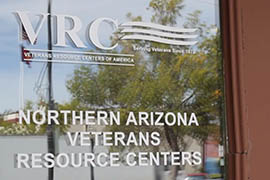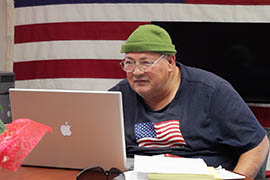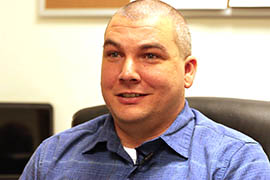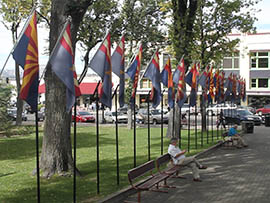Cronkite News has moved to a new home at cronkitenews.azpbs.org. Use this site to search archives from 2011 to May 2015. You can search the new site for current stories.
VA grants fight veteran homelessness beyond Phoenix, Tucson areas
PRESCOTT – Richard Findley sits at a circular table at the Veterans Resource Center here browsing the Internet and reading news articles on his laptop. As other veterans walk through the door, Findley looks up and waves hello.
Findley, a homeless veteran who lives in a storage unit, says he spends many of his days at the Veterans Resource Center enjoying the air conditioning, using the Wi-Fi or having a cup of coffee.
“It’s fun to sit around and talk, chew the fat with other people and basically reminisce over the different experiences, that kind of thing,” Findley said.
Recognizing that homelessness among veterans is a problem in rural areas as well as cities, the U.S. Department of Veterans Affairs recently awarded a $2 million grant to the Veterans Resource Center, which also has offices in Flagstaff and Bullhead City.
Four of the seven organizations receiving grants from the Supportive Services for Veteran Families program in Arizona are based in rural areas.
The Veterans Resource Center uses the money for administration and providing temporary financial assistance for veterans, said Nicholas Wood, the Prescott site director.
“It goes to assisting veterans who are behind on their rent (or) have a shut-off notice for utilities,” he said. “We can assist people that have late storage fees, things like that.”
A 2013 homelessness report by the Arizona Department of Economic Security found that 389 veterans were homeless outside of metro areas, up from 273 in the previous year. In comparison, the report listed 322 homeless veterans in metropolitan Tucson and 547 in the Phoenix area.
Arizona ranks fourth in the nation for the number of homeless veterans who live outside of metro areas, according to a 2013 report by the U.S. Department of Housing and Urban Development. It ranks behind Texas, Georgia and Oregon.
Since the Veterans Resource Center opened here a year ago, it has served 252 households that included around 372 people, Wood said. In all, its three sites serve 700 households, according to the VA.
“It’s kind of a hidden problem, especially in smaller communities,” Wood said. “It’s an issue it’s not necessarily the most nice topic to talk about. It’s kind of shameful that our veterans could be homeless. That’s terrible.”
Before working as the site director, Wood worked as a case manager, connecting veterans with housing or other services. Recently, he ran into a family – a veteran, his wife who was pregnant with twins and their four kids – whom he had helped move from the sedan they were living in to permanent housing.
“They seemed very excited to be alive,” Wood said. “They had that spark again that they seemed to be lacking when I first met them.”
National Community Health Partners in Tucson, which serves veterans in Pinal County and Yuma, received a grant worth $1.1 million to help veterans and their families. The organization serves around 200 households.
Rafael Jubera, the project director for the organization’s Housing for Heroes program, said veterans are thrilled when they receive help.
“Their reactions are just overwhelming,” he said. “Some of them consider us part of their family. The friendship is lasting, and even though it’s temporary case management, the effects of it are long-term.”
Recently, case managers met a homeless veteran whose wife was pregnant. She went into labor that weekend, so the organization rushed to find the family temporary housing at a hotel until they could help with more permanent housing.
“Probably about three days afterward, we were able to secure permanent housing for that couple and that baby was able to come back to a home,” Jubera said.
Richard Guinn, a case manager at the Veterans Resource Center in Prescott, said he enjoys his job because he gets to give back. He said some of the people he works with continue to check in after he’s done assisting them.
“I’ve got one gentleman who tells me how the fishing is. He’s got a roof over his head. His life is back together,” he said. There’s some type of normality, but he fishes and enjoys it. And he likes teasing me with, ‘I’m having trout today.’”
Marcy Karin, a clinical professor of law at Arizona State University, said veteran homelessness is mostly associated with metro areas because the problem is more visible and because more organizations exist to help individuals. The problem isn’t well-known in rural areas because the population is hidden.
“They are harder to find and identify,” she said.
Karin said veteran homelessness has been going down in metro areas. She pointed to Phoenix, which announced in December that it ended chronic veteran homelessness in the city.
But in rural areas, those numbers have been going up. Karin said there is less infrastructure, resources, transportation and housing available to help homeless veterans in those areas.
“The geography really does matter,” Karin said.
For Wood, working at the Veterans Resource Center is an honor. He loves coming into work and helping veterans.
“I feel that our veterans, even if they served in peacetime, they signed their name on that line and put their life on the line,” Wood said. “They gave their life for this country. It should be all we can do to get them into housing.”











